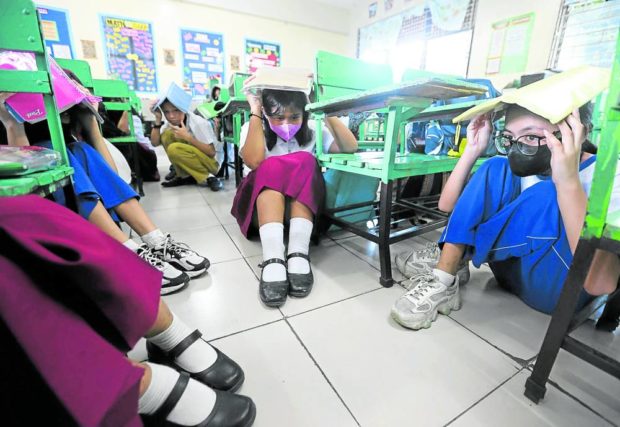DepEd’s ‘surprise’ quake, fire drills have a schedule

MAIN RULE: DON’T PANIC | Grade 6 pupils take part in the “duck, cover, hold” exercise at Rafael Palma Elementary School in Manila on Nov. 10, 2022. (File photo by MARIANNE BERMUDEZ / Philippine Daily Inquirer)
MANILA, Philippines — Duck, cover, hold!
Schoolchildren may already know the drill once the Department of Education (DepEd) conducts “unannounced” exercises on how to protect themselves during earthquakes and fires.
For DepEd’s “surprise” drills will actually follow a schedule — every first and third week of the month — so the kids may no longer be caught unprepared.
“Having an effective preparedness plan is the key in preventing disasters and saving lives,” DepEd said as it issued Order No. 53.
The agency said that since emergencies and calamities may happen anytime and anywhere, all public schools are mandated to conduct local drills and simulation exercises.
When practiced frequently, DepEd said, these preventive measures would become “automatic reflexes.”
“Aligned with the department’s commitment of ensuring [the] safety and well-being of learners and school personnel, all public schools are hereby required to conduct unannounced earthquake and fire drills every first and third week of every month,” the Dec. 9 order said.
Quake drills usually involve ducking or dropping down on the floor; taking cover under a sturdy table, desk and other furniture or against an interior wall; and holding on to the furniture until the quake stops and it is safe to move.
Fire drills entail the safe movement or evacuation of people out of a building in the event of a fire.
Vice President and Education Secretary Sara Duterte instructed school heads and school officials in charge of school disaster and risk reduction management coordination to lead the planning, implementation, and regular monitoring of the drills in their respective schools.
“These drills are to ensure that all learners are properly guided on what should be done during and after an earthquake or occurrences of fire in schools,” the order read.
Bracing for Big One
The DepEd order also directed schools in Metro Manila, Rizal, Cavite, Laguna and Bulacan to come up with a separate and specific disaster plan for a magnitude 7 or an earthquake of a higher intensity.
“The plan shall specifically lay down the response should there be a scenario involving mass casualties of learners and personnel,” it said.
In July this year, the magnitude 7 earthquake that hit the province of Abra resulted in 226 destroyed schools and an estimated cost of P1.3 billion for the repair and rehabilitation of totally and partially damaged classrooms.